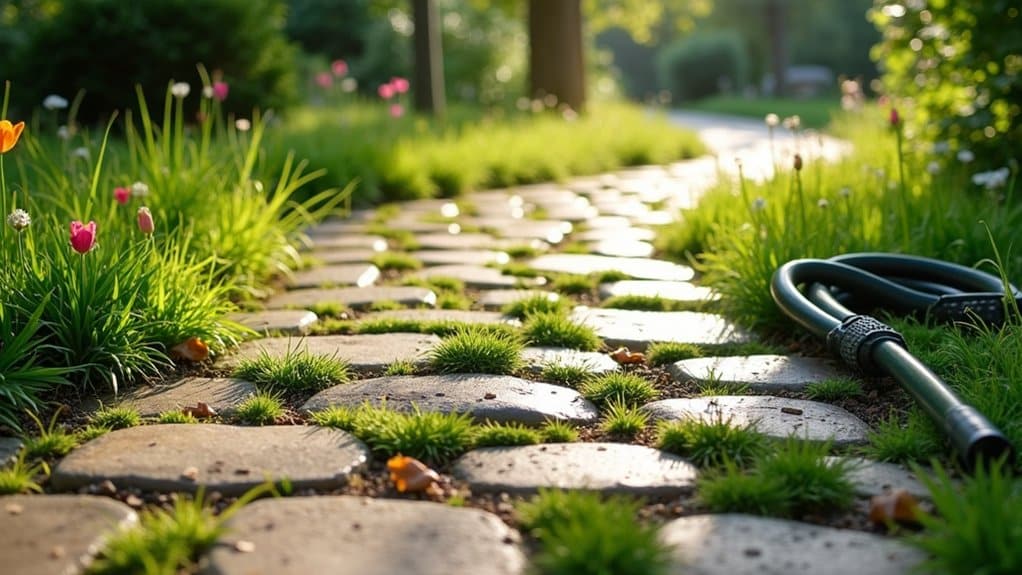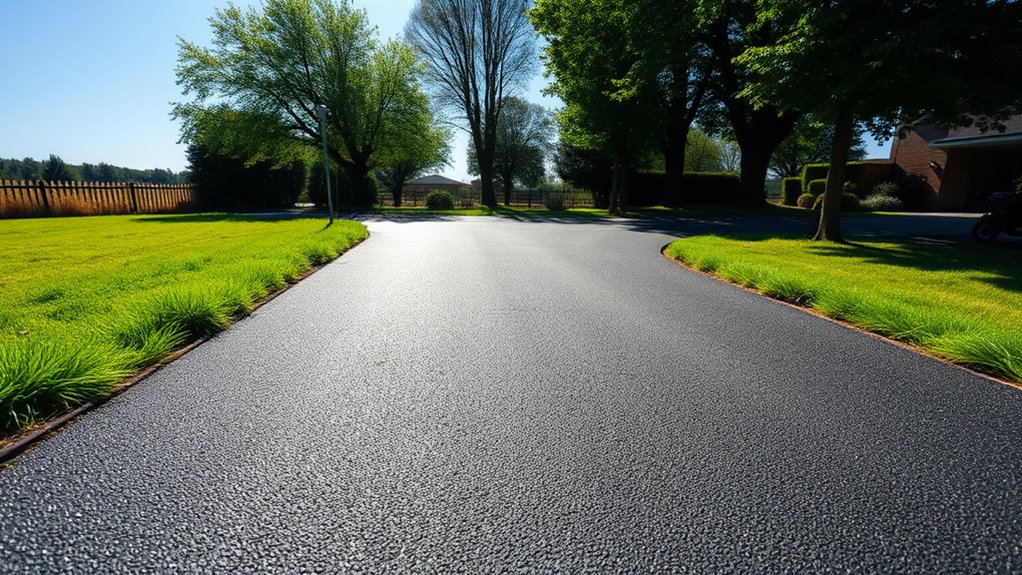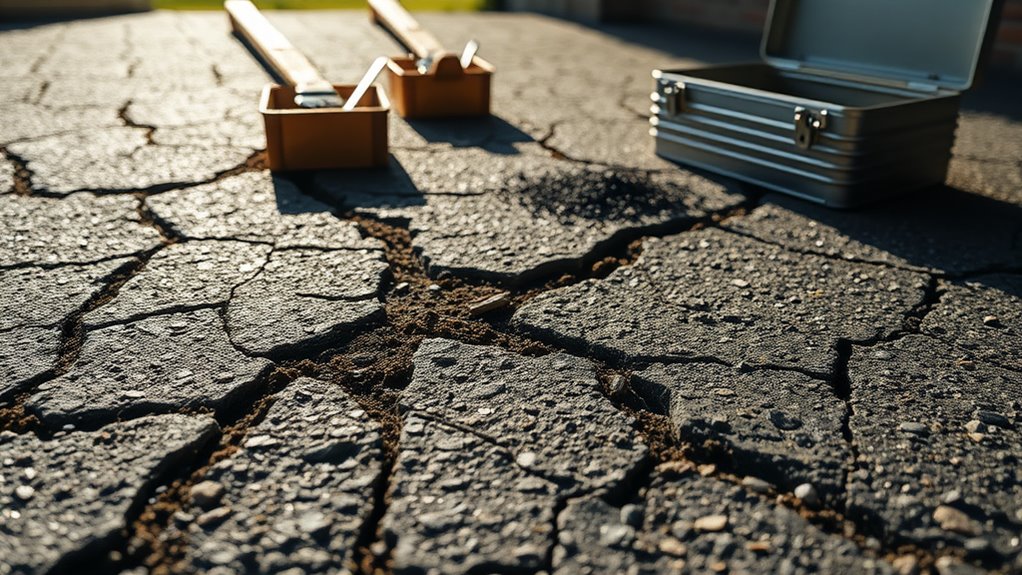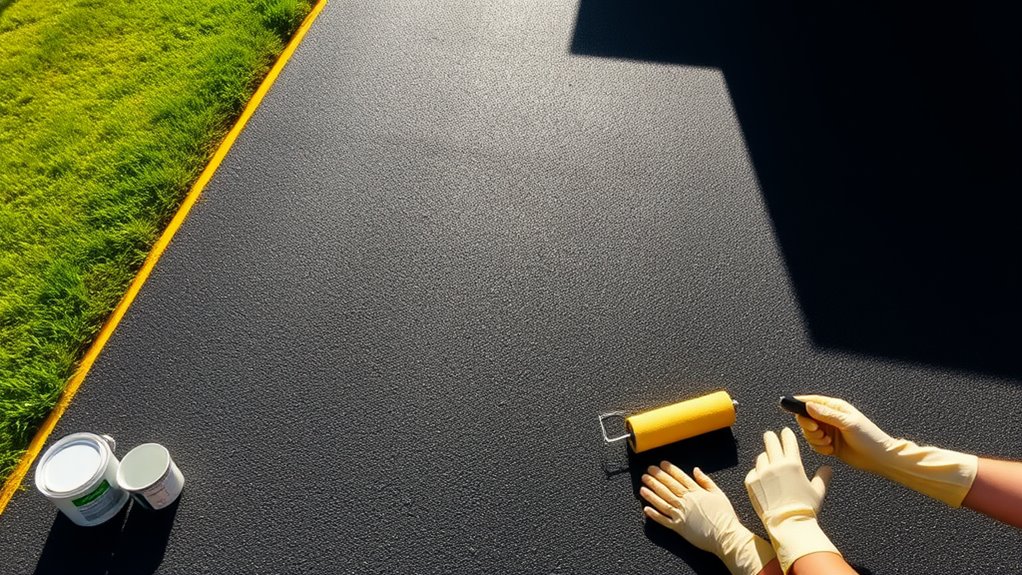Yes, permeable driveways require specific maintenance to function properly. Regular inspections are crucial to spot issues such as sediment build-up and drainage problems. Seasonal tasks like sweeping, removing debris, and checking for erosion are key to keeping their drainage capacity intact. It’s also important to watch for any surface deformation and moisture accumulation. Managing contaminants and occasionally testing performance with an infiltrometer can help extend the lifespan of your driveway. Stay tuned for more essential maintenance tips and strategies.
Table of Contents
ToggleKey Takeaways
Yes, permeable driveways do require special maintenance to ensure they perform well over time. Regular inspections are important to spot issues like sediment build-up and weeds, which can block water flow.
Seasonal upkeep, such as sweeping and removing debris, is key to keeping the surface clear for water infiltration. It’s also wise to carry out structural checks annually to catch any surface deformities, cracks, or drainage issues early on.
Additionally, monitoring the performance through infiltration rate tests and visual inspections is vital for maintaining effective drainage. By staying on top of these maintenance tasks, you can help prolong the lifespan of your permeable driveway.
Importance of Regular Inspections
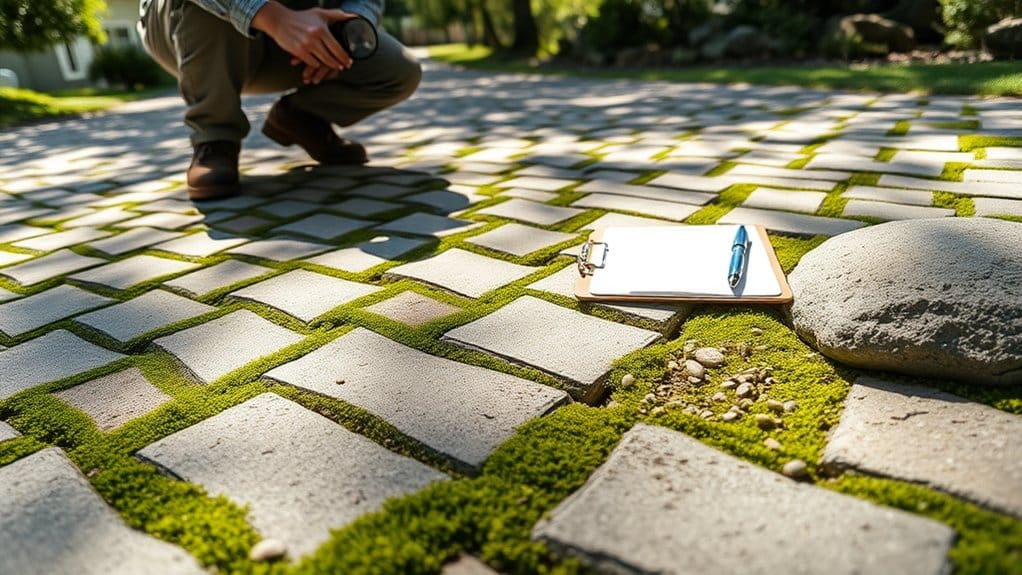
Regular inspections of permeable driveways are vital for their performance and durability. Stick to a regular inspection schedule to identify issues early, such as sediment build-up or weeds in the joints.
After rainfall, visually check the surface to assess its condition and look for any pooling that may indicate infiltration problems. It’s important to conduct infiltration rate tests within 60 days of installation and then annually to ensure your driveway meets the required standards. Additionally, remember that maintaining permeable surfaces can help reduce stormwater runoff and sediment wash-off, contributing to environmental benefits. Proper site preparation is also essential during the installation phase to ensure long-lasting effectiveness.
Keep a record of your inspections to monitor trends over time, and if you notice infiltration rates dropping, arrange for maintenance right away. By prioritizing these checks, you’ll help ensure the long-term effectiveness and structural soundness of your permeable driveway.
Seasonal Maintenance Practices
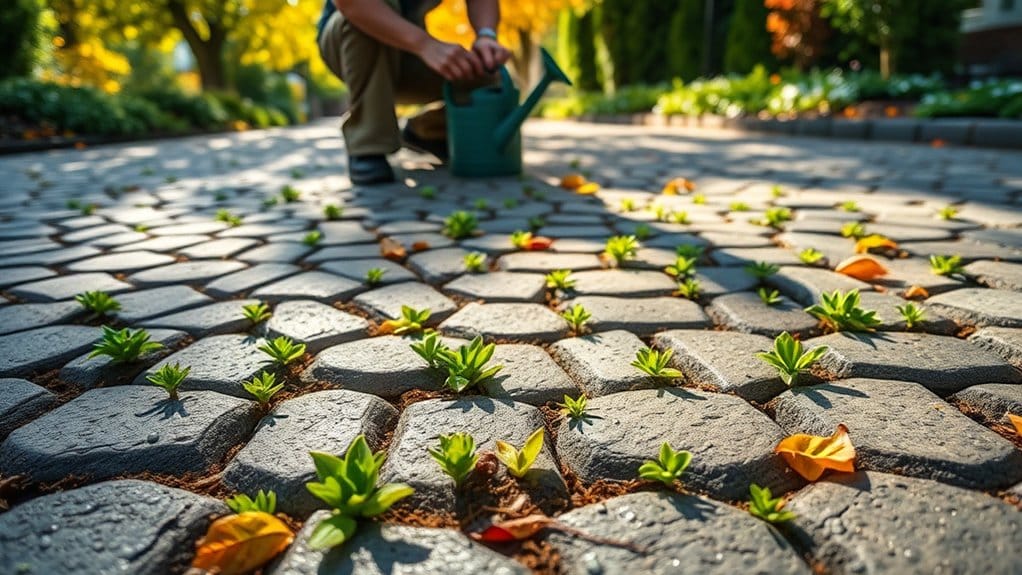
Maintaining the performance of permeable driveways throughout the seasons is crucial for their longevity and functionality. Here’s a straightforward guide for effective seasonal maintenance:
- Spring Cleaning: Sweep the driveway to remove debris, particularly in areas where snow may have accumulated. Check drainage systems and top up joint aggregates to keep them permeable. Regular maintenance of permeable paving is essential for preserving infiltration capacity.
- Summer Upkeep: Regularly sweep or use a rotary brush to clear lawn clippings and other summer debris. Look out for any erosion or settling, and promptly remove weeds to stop roots from taking hold.
- Late Autumn Preparation: Clear away fallen leaves and organic matter to ensure proper drainage. Inspect for any damage and replenish joint aggregates before winter sets in.
Debris and Contaminant Management Strategies
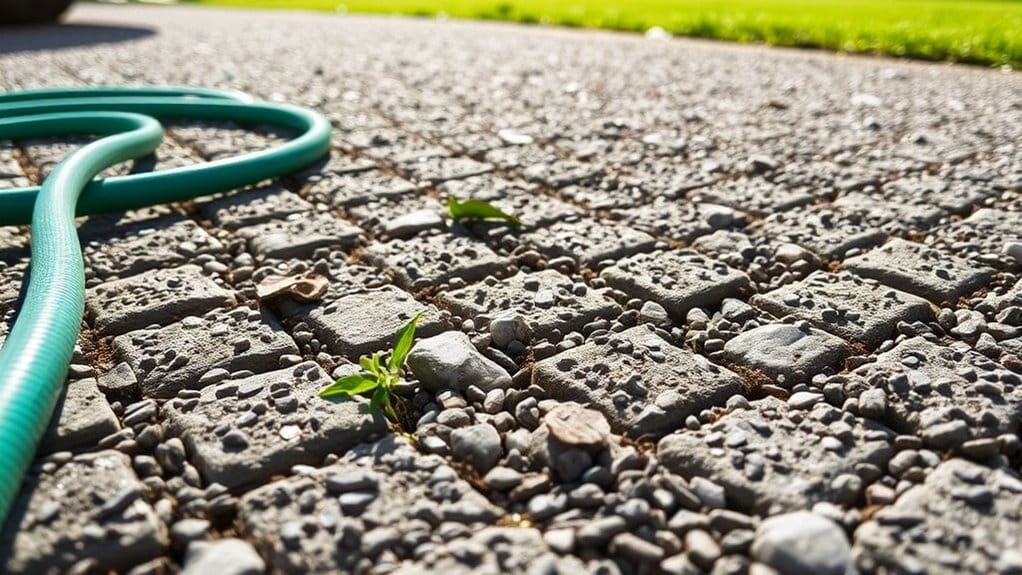
To keep your permeable driveway in good working order, managing debris and contaminants is crucial. Regularly removing debris helps maintain infiltration and prevents sediment build-up. Aim to sweep your driveway once or twice a year using a commercial vacuum. For best results, use a wet/dry vacuum to effectively clear away organic matter. Permeable paving can reduce stormwater runoff significantly, enhancing the overall effectiveness of your driveway. Additionally, maintaining a sustainable drainage solution will ensure that your driveway continues to function efficiently over time.
Here’s a quick look at effective strategies:
| Strategy | Purpose |
|---|---|
| Sweeping | Prevents sediment build-up |
| Regular drainage maintenance | Ensures clear water flow |
| Timely litter removal | Maintains surface effectiveness |
Structural Checks and Repairs
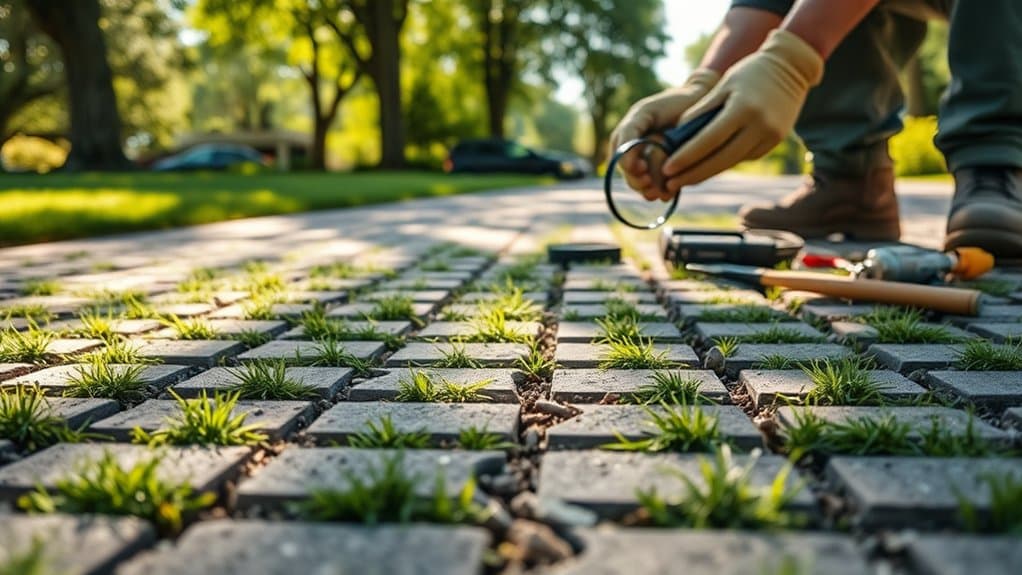
When carrying out annual inspections of your permeable driveway, it’s crucial to spot any signs of structural issues.
To maintain its integrity, follow these checks:
- Look for surface deformation, cracks, and damage to the edges that could disrupt load distribution.
- Check for areas of standing water, as this may signal compromised support beneath the surface.
- Replace any broken pavers quickly, using repair methods that match the existing materials to preserve permeability.
Addressing these problems promptly can prevent further damage. Additionally, ensuring proper drainage solutions is vital for maintaining the longevity of the driveway.
Regular checks and swift repairs not only sustain the driveway’s performance but also prolong its lifespan, ensuring your investment remains functional and attractive.
Monitoring Performance and Troubleshooting Issues

Once you’ve confirmed the structural integrity of your permeable driveway through regular inspections and repairs, it’s vital to monitor its performance.
Use the ASTM C1701 infiltrometer to accurately measure surface infiltration rates. Conduct visual inspections in spring to check for sediment buildup or vegetation that could block water flow. If you notice any issues, consider using vacuum sweeping to restore the infiltration capacity.
It’s also wise to carry out annual capacity tests to assess any loss of permeability and identify when deeper maintenance is required. Additionally, keep an eye on water quality and outflow temperature; these can offer insights into the long-term performance of your drainage system.
Promptly addressing problems like standing water or surface cracks will help ensure your driveway remains functional and efficient.
Frequently Asked Questions
Can I Use Regular Driveway Sealants on Permeable Surfaces?
You cannot use regular driveway sealants on permeable surfaces because they are not compatible. Standard sealants can clog the pores, which reduces both protection and drainage. This may lead to water pooling, risking damage to your driveway. For example, if you seal a permeable driveway with a regular sealant, you might find that rainwater doesn’t drain properly, causing unsightly puddles and potential erosion. It’s best to use sealants specifically designed for permeable surfaces to maintain their effectiveness.
What Types of Plants Are Best for Permeable Driveways?
For permeable driveways, choose drought-resistant ground covers such as creeping thyme and blue star creeper. These hardy plants create an attractive barrier, require minimal maintenance, enhance permeability, and support local wildlife effectively.
How Do Permeable Driveways Affect Property Value?
Permeable driveways can boost property value by managing stormwater effectively, leading to potential investment gains. Research shows that properties with larger areas of permeable paving often command higher sale prices. For instance, a home with a permeable driveway not only looks appealing but also demonstrates a commitment to sustainability—making it a worthwhile addition to your property.
Are Permeable Driveways Eco-Friendly Options?
Permeable driveways are eco-friendly options that provide notable sustainability benefits. They help reduce stormwater runoff, encourage groundwater recharge, and lessen environmental impact. This contributes to healthier urban ecosystems, improved air quality, and supports biodiversity and resource conservation. For example, by allowing rainwater to filter through the surface, these driveways can prevent flooding and reduce the burden on drainage systems.
Can Permeable Driveways Handle Heavy Vehicle Loads?
Can permeable driveways handle heavy vehicle loads? Yes, they can when properly engineered. With the right materials and installation, they can support loads exceeding 30 tonnes. For example, if you’re considering a driveway for a large vehicle like a van or 4×4, a well-constructed permeable driveway will manage that weight effectively.
Conclusion
In summary, maintaining your permeable driveway is similar to caring for a garden; regular upkeep ensures it stays in good shape. Conduct routine inspections and seasonal maintenance to stop small issues from becoming big ones. Keep an eye out for debris and contaminants, and don’t forget to check the structure. By monitoring its performance, you can identify potential problems early, ensuring your driveway remains functional and visually appealing. With this level of care, you’ll reap the rewards of your permeable investment for many years.
Maximize the durability of your tarmac driveway by understanding the ideal weather conditions for installation—discover the secrets to perfect timing Read more
Discover the common causes of tarmac driveway cracks and learn effective repair methods to protect your investment—your driveway deserves the Read more
Before you paint your tarmac driveway, discover essential tips and techniques that can transform its appearance and durability—don't miss out Read more

